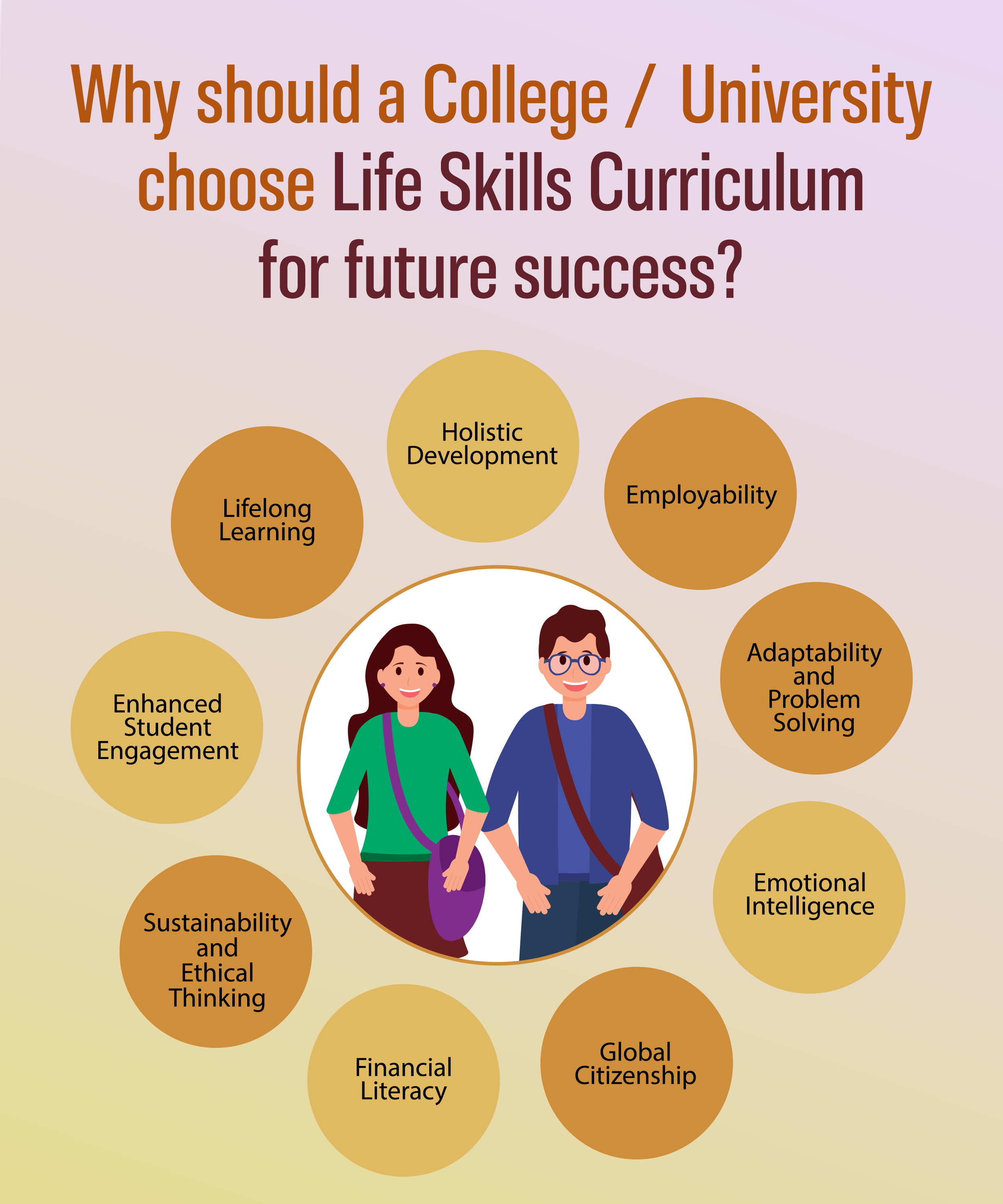
Why should a College/University choose Life Skills Curriculum for future success?
 A student’s stint in a college or university is meant to prepare her/him for the challenges and expectations of professional life and all the adjustments it entails to maintain the right work-life balance. Integrating a Life Skills Learning curriculum into college or university education offers a comprehensive approach to preparing students for success in both their personal and professional lives. This educational model doesn’t just focus on academic achievement and professional skills, but also emphasizes the importance of developing essential life skills or positive behaviors. Here are several compelling reasons why institutions should adopt this curriculum for future success:
A student’s stint in a college or university is meant to prepare her/him for the challenges and expectations of professional life and all the adjustments it entails to maintain the right work-life balance. Integrating a Life Skills Learning curriculum into college or university education offers a comprehensive approach to preparing students for success in both their personal and professional lives. This educational model doesn’t just focus on academic achievement and professional skills, but also emphasizes the importance of developing essential life skills or positive behaviors. Here are several compelling reasons why institutions should adopt this curriculum for future success:
1. Holistic Development
Life Skills Learning fosters holistic development of students, encompassing emotional, social, and cognitive growth. This well-rounded approach ensures that graduates are not only proficient in their fields of study but are also well-equipped to handle the complexities of real-world situations.
2. Employability
Employers increasingly seek candidates with strong interpersonal skills, adaptability and emotional intelligence, alongside technical capabilities. A Life Skills Learning curriculum prepares students for their professional careers by developing these competencies, making them more attractive to potential employers and more prepared for diverse workplace environments. In fact, life skills often become the key differentiator when it comes to landing a plum job.
3. Adaptability and Problem-Solving
The future workplace is unpredictable, with rapid technological advancements and changing job markets. Life skills such as adaptability, critical thinking and problem-solving prepare students to navigate these uncertainties, adapt to new roles and innovate solutions to complex challenges. Being nimble is now the buzz phrase in the emerging job market and only life skills or behavior control can give you that edge.
4. Emotional Intelligence
Courses that enhance emotional intelligence, including empathy, self-awareness, and stress management, are crucial for building strong interpersonal relationships and maintaining good mental health. These skills are invaluable in creating a supportive work environment and in leading effectively.
5. Global Citizenship
With globalization, understanding and appreciating cultural diversity has never been more important. Life Skills Learning curriculums often include components that foster global awareness and citizenship, preparing students to work in diverse teams and contribute positively to the global community. Your worldview today defines your personality.
6. Financial Literacy
Financial literacy is a critical life skill that is often overlooked in traditional education. Incorporating it into the curriculum prepares students for real-life financial responsibilities, such as budgeting, investing, and understanding taxes, which are essential for personal and professional success.
7. Sustainability and Ethical Thinking
Teaching students about sustainability and ethics prepares them to make decisions that positively impact the world. This focus can inspire future leaders to prioritize corporate social responsibility and environmental sustainability in their careers.
8. Enhanced Student Engagement
Courses designed around life skills are often more interactive and practical than traditional lectures, leading to higher levels of student engagement and satisfaction. This hands-on approach to learning can enhance retention rates and overall student success.
9. Lifelong Learning
Instilling the value of lifelong learning is perhaps one of the most significant benefits of a Life Skills Learning curriculum. By teaching students how to learn, adapt, and grow continuously, colleges and universities set them up for a lifetime of personal and professional development.
Incorporating a Life Skills Learning curriculum is a forward-thinking approach for educational institutions aiming to equip students with the tools necessary for future success. By balancing traditional academic rigor with essential life skills, colleges and universities can prepare graduates who are not only capable professionals but also resilient, adaptable, and ethical individuals ready to navigate the complexities of the modern world.

